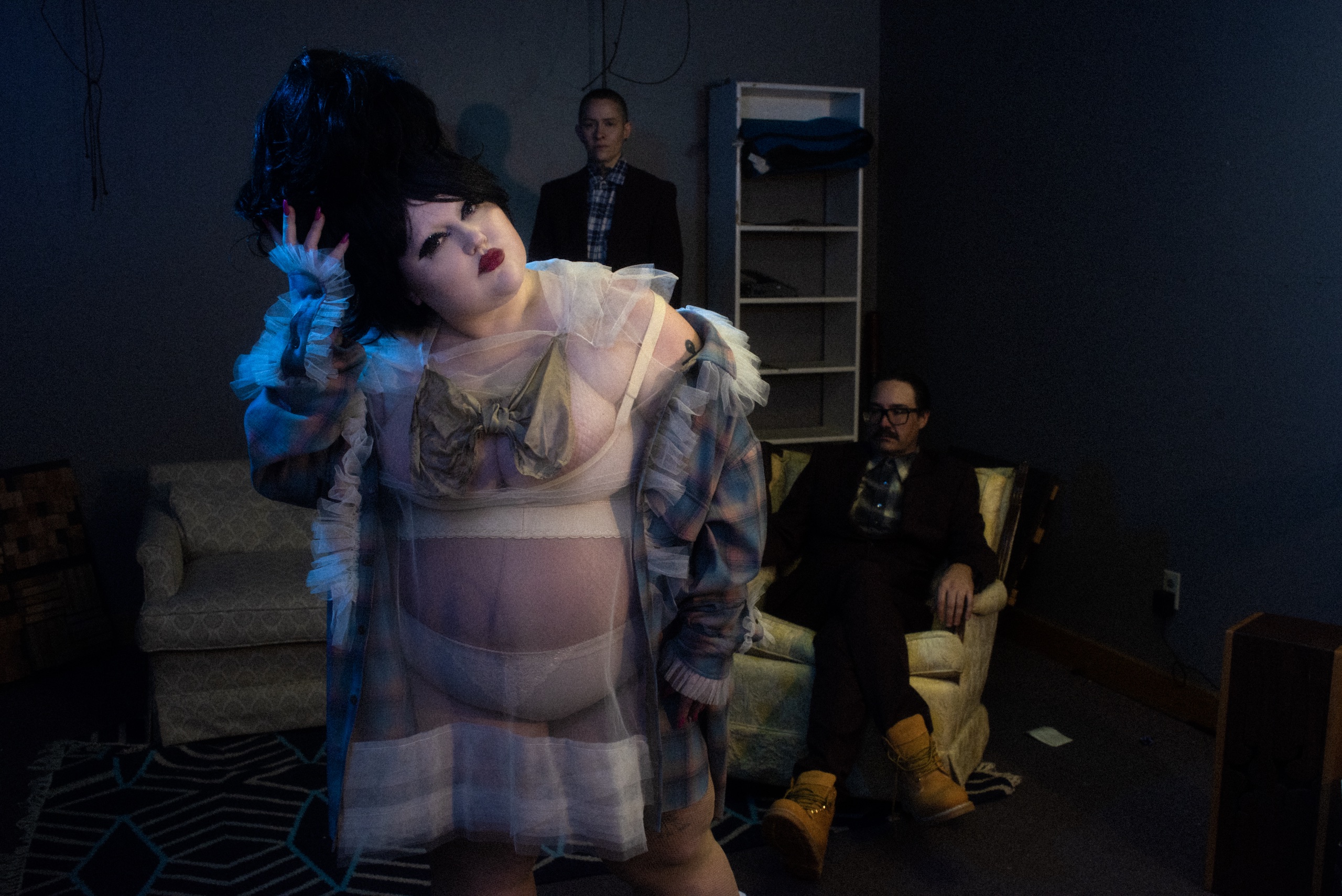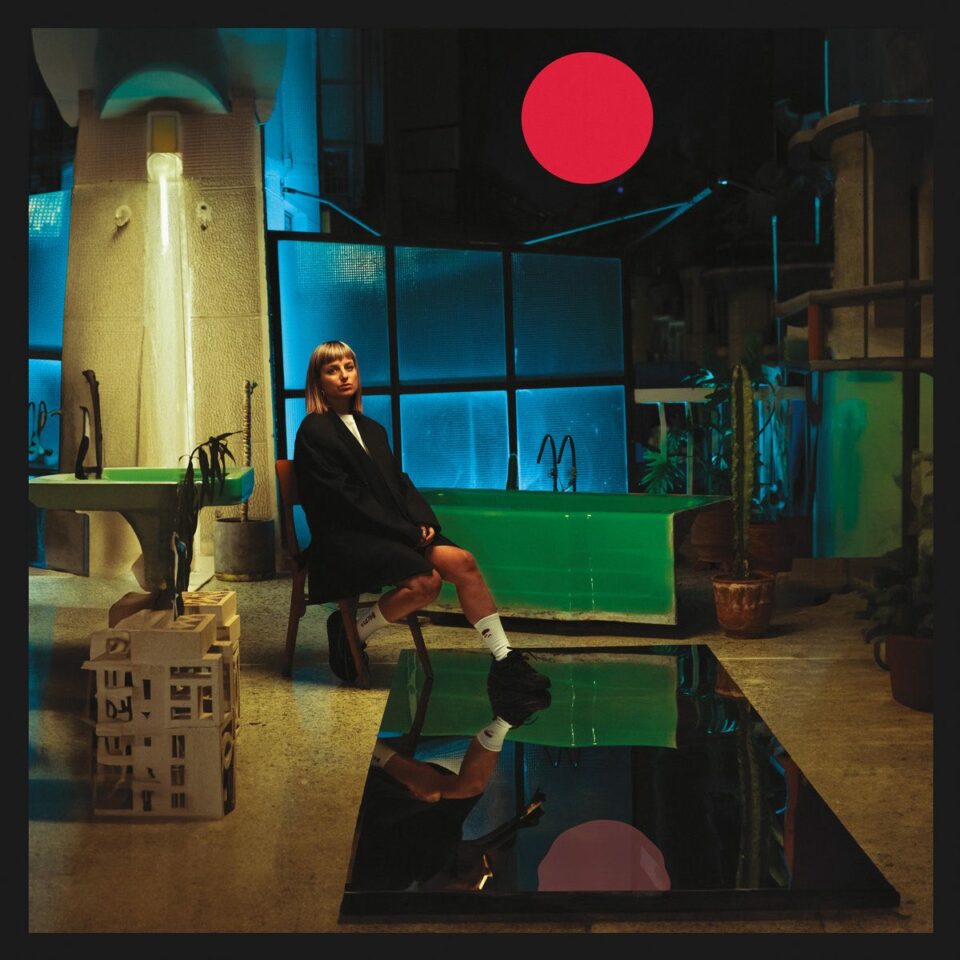Entering Zebulon at 5 p.m. on a Saturday afternoon in February feels like stepping into a speakeasy. The bar/café/concert venue in Los Angeles’ Frogtown neighborhood is dark and heaving. The front of the stage is packed as Gossip performs an unbridled show for this industry-heavy crowd. The attendees, for their part, shed their music business nonchalance. They lean into not just the infectious songs from the band’s new album, Real Power, but also to the irresistible charms of the trio’s frontperson, Beth Ditto.
The Arkansas-born, Portland-based Ditto has everyone in the palm of her hand, not in small part due to her sugary charm and natural wit. Her Southern accent is warm and syrupy as she exclaims that she feels like Marilyn Monroe every time the fan blows up the skirt of her flowered dress. She apologizes for taking the stage late, but says that her eyeliner was crooked and she had to fix it. Then she announces that she knew this was an important show so she had to put her wig on, as she tugs at it. Her bandmates seem resigned to Ditto giving away all her backstage secrets. Meanwhile Ditto takes sneaky Juul hits in between belting out verses in her powerhouse voice. She’s giving Meat Loaf vibes circa Rocky Horror, and there’s nothing wrong with that.
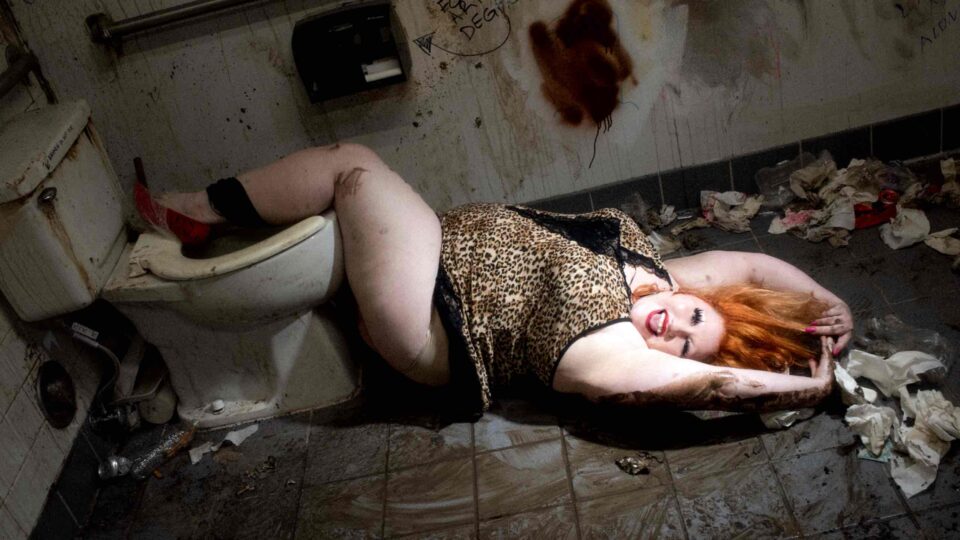
The next day, when we meet up at her hotel in Hollywood, we’re wearing matching colors, but the 43-year-old Ditto’s stylishness puts me to shame. Her black crystal pleated dress has a casual chic to it that’s elevated by her silver pointy-toed, low-heeled ankle boots. A black beret sits atop her pink-orange hair which brings a pop of color to her eyebrow-less face. Her eyelids are heavily blacked out with cat-eye liner. Her denim jacket has a few pins on it. One of them says “TOUCH” in all caps and I really want to reach out and feel the fabric of her dress. She’s more than OK with me doing so (after I ask permission, of course). She says it’s old, but inspired by a garment her aunt used to have.
“Is money, recognition, and fame the goal? Most of the bands I worship, that changed the way I looked at the world, a lot of those people died without the money or recognition they deserved.”
Ditto is visibly tired, having not slept properly over the last two nights, but she’s rallying. She inquires if she could have a coffee, and when she’s asked how she’d like it, she says, “I honestly don’t care. You could make it with ditch water.” This is the first of Ditto’s many colorful phrases, and this kind of unfiltered chatter makes you feel like she is already your friend. This works both ways, as Ditto shares that she always thinks she’s friends with people after one conversation with them. Her openness comes out in her lyrics, her acting roles, her 2012 memoir, her defunct advice column for The Guardian, her short-lived fashion line, her icon status within the queer community, and her body-positive image. Seeing her pose nude on the cover of NME and walk the runways of high-profile designers like Jean Paul Gaultier, Marc Jacobs, and Stella McCartney is groundbreaking.
“Is money, recognition, and fame the goal?” she asks, speaking about the big creativity picture. “So many people make a living doing what they’re doing in bands, but they’re not on the cover of magazines. Most of the bands I worship, that changed the way I looked at the world, a lot of those people died without the money or recognition they deserved. It’s hard to do things out of expectation. It’s hard when you rely on creativity for a living. It’s hard when you have to force creativity.”
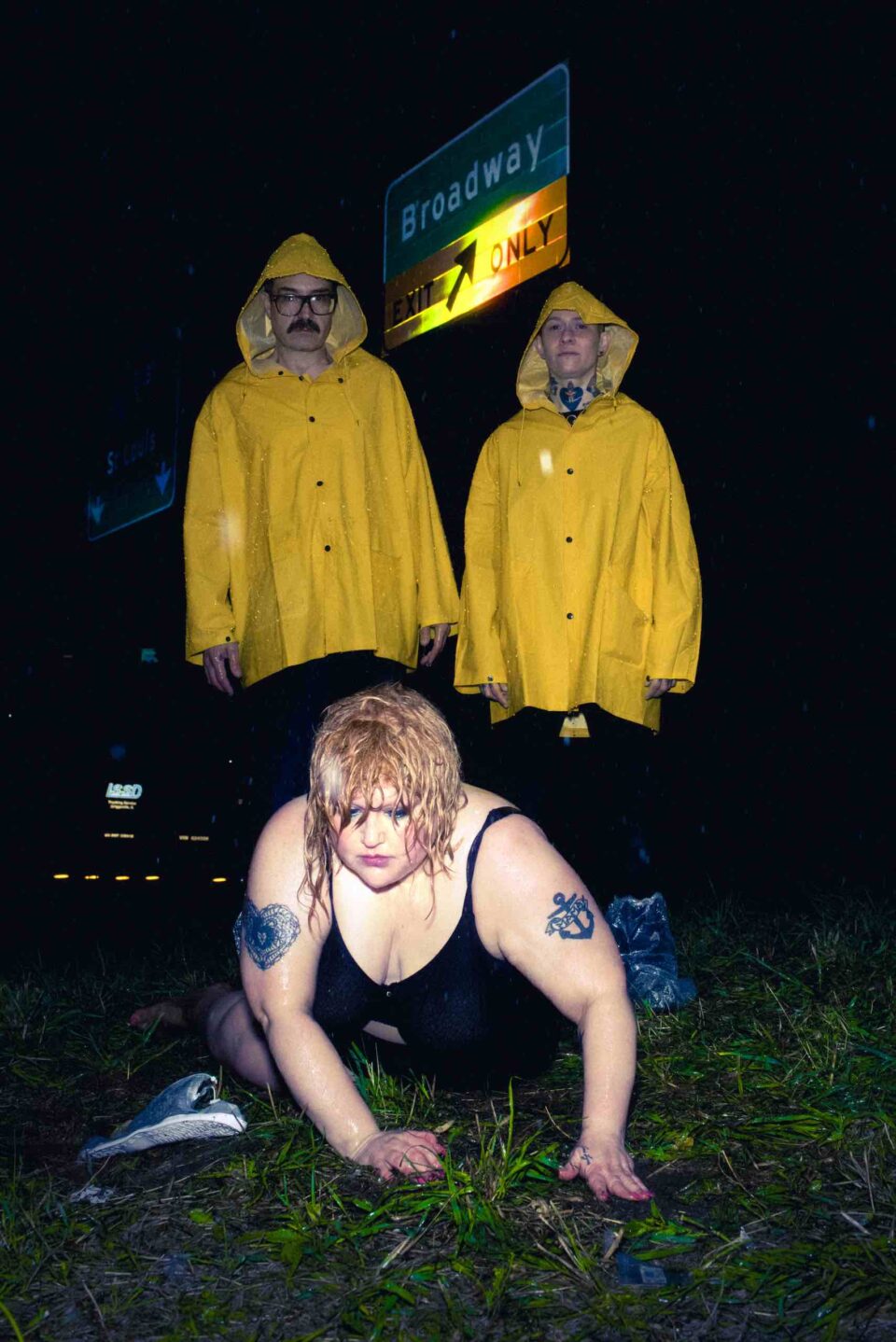
When Ditto began writing Real Power, she thought she was working on a new solo album to follow 2017’s Fake Sugar. She brought in her Gossip bandmate Nathan “Brace Paine” Howdeshell to work on the songs with her and the further they got into it, the clearer it became that they were, in fact, writing the next Gossip album. Jam-packed with disco-driven, funk-fueled, feel-good grooves that have true emotive pull, Real Power comes 12 years after the group’s A Joyful Noise. It’s Gossip’s second studio album produced by Rick Rubin, who worked with the band on 2009’s Music for Men.
“I like working with Rick a lot,” says Ditto. “I think there’s something special about the way you work with a band as opposed to how you work with a solo artist. With me and Nathan and Hannah [Blilie], there isn’t anybody in the driver’s seat. It goes as it goes. Rick really reacts to that. He gets on the same level. Rick is good at seeing the potential in everybody. Whatever you need to be reassured with, he will reassure you. Whenever you need to be taken out of your head or your ego… That’s really good, because we’re so in-the-moment.” Gossip was even more ensconced with Rubin for the recording of Real Power as it came together before, during, and after quarantine at Rubin’s Kaua’i complex. “I love that he always shows up when you need him. He always saves,” Ditto says.
“No one talked shit about Boy George in my house. [My mom] was digging it, Wham! and shit. How crazy, queer, and subversive is that tiny moment of pop culture?"
Ditto’s trajectory into pop culture traces back to a blip in her young years in Searcy, Arkansas when she was exposed to MTV. “Searcy is controlled by Harding University, which is pretty well-known in the Christian college scene, and [because of Harding] you couldn’t get MTV,” she explains. “There was a brief window in my childhood, in the most formative years of my life, where I saw [the music videos for] ‘Like a Virgin,’ ‘Billie Jean,’ ‘She’s So Unusual,’ ‘Karma Chameleon...’ Then they took it away. It’s this time capsule in my brain. I would never see anything like that again unless I seeked it out. I swear to God, this is why they were afraid of us watching, because there’s a bigger world out there. I’ve seen it now. I can’t go back. It’s somewhere. All I have to do is find it.”
What Ditto saw in those few MTV moments were enhanced by her family’s attitude and involvement with music. Her mother, who was 24 when she had Ditto, her fourth child, was, “hip,” according to Ditto. “No one talked shit about Boy George in my house. She was digging it, Wham! and shit. How crazy, queer, and subversive is that tiny moment of pop culture?” There was always music in their house, which she thought was the norm. “Sound buffs” is how Ditto describes her entire family. “We wouldn’t have money and would barely have any food, but my dad would come home with this crazy equipment. We had the most incredible receiver and huge speakers.” One of her brothers played drums in their cousin’s band when he was 14, touring the Southern casino circuit, performing alongside the likes of Little Richard. The importance of that didn’t register with Ditto at the time, but in retrospect, the “firsthand knowledge of his queerness and how that works was just crazy.”
Ditto had to wait years to be legally married to her previous longtime partner with whom she had been since the age of 18. Now, her partner is transgender musician Teddy Kwo, who’s part of Gossip’s touring band and whose name she drops in conversation often. Yet Ditto chuckles when her icon status on the queer community comes up. “People in numbers is visibility,” she says. “Visibility can feel dangerous. That happens with every social movement. When you think about visibility in context, no matter what marginalized group we’re talking about, what it takes to become a movement is gathering in one place, being together, in solidarity. What happens is, that becomes a hot topic. Those are the things that change laws. People start to think. People start to question. Because you’re a movement, you’re making ground, you become vulnerable. You’re demanding rights, demanding to be seen. When that happens, people start to debate whether you have the right to do whatever it is you’re doing. Then you start to see people debating your existence, and that’s fucking crushing.”
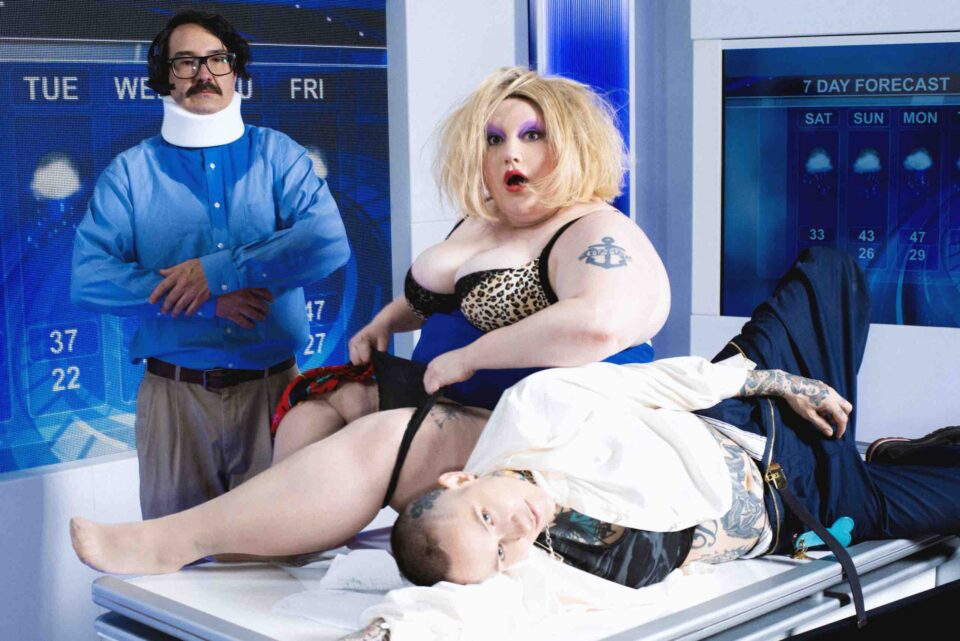
Ditto has been standing up in this space since she was a teenager, but has sympathy for members of the queer community who would prefer not to shy away from the spotlight and live without fear. On the other hand, she says, “It’s worth it to be visible and feel afraid [rather] than to be alone.”
If Ditto is guilty of anything, it’s that she cares too much. She cares about people’s feelings. She cares about the music she’s making. She cares about the music she’s listening to. She cares about being ethical, and that carried through to her clothing line ventures, which resulted in higher-priced items—from which she made zero profit, but cared too much about people balking at how much the clothes cost, so she stopped making them. “Can you imagine living life without worry about how you affect people? What is that like?” she marvels. “In the end, what really matters is, can you look yourself in the face? For me, that’s a big thing. If I make this decision, is this something I can face myself with?” FL

